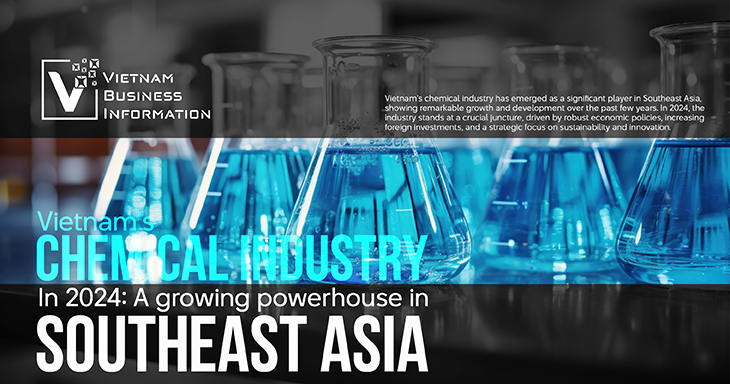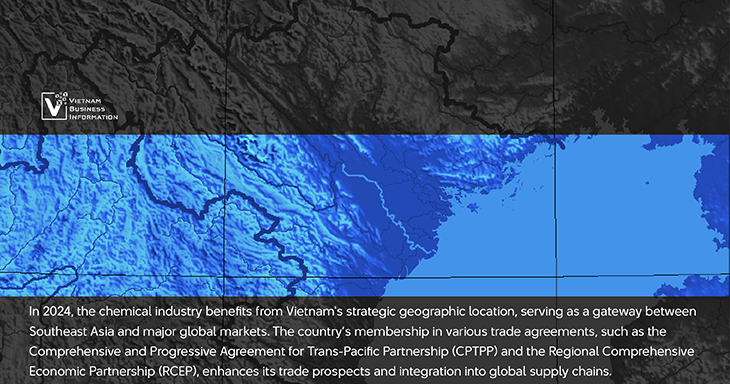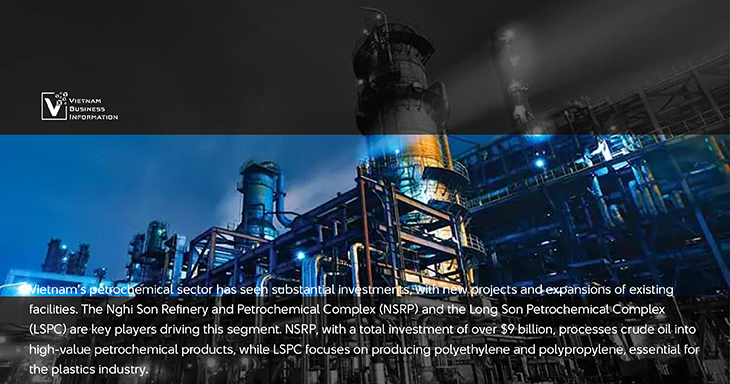Published Jul 2024
Vietnam's chemical industry in 2024: A growing powerhouse in Southeast Asia
Vietnam's chemical industry has emerged as a significant player in Southeast Asia, showing remarkable growth and development over the past few years. In 2024, the industry stands at a crucial juncture, driven by robust economic policies, increasing foreign investments, and a strategic focus on sustainability and innovation.

This article explores the current state of the industry, key growth drivers, challenges, and future opportunities.
Economic and industrial context
Vietnam's economy has consistently outperformed many of its regional counterparts, achieving a GDP growth rate of around 6-7% annually. The chemical industry is a vital component of this economic success, contributing approximately 10% to the national GDP. With about 1,800 enterprises involved, the industry provides employment to hundreds of thousand workers, ranging from labor-intensive production roles to highly skilled research positions.
In 2024, the chemical industry benefits from Vietnam's strategic geographic location, serving as a gateway between Southeast Asia and major global markets. The country’s membership in various trade agreements, such as the Comprehensive and Progressive Agreement for Trans-Pacific Partnership (CPTPP) and the Regional Comprehensive Economic Partnership (RCEP), enhances its trade prospects and integration into global supply chains.

Key drivers of growth
Foreign Direct Investment (FDI)
Vietnam has become a magnet for FDI in the chemical sector due to its stable political environment, competitive labor costs, and improving infrastructure. In 2023 alone, the chemical industry attracted over $2 billion in FDI, a significant increase from previous years. Major global players such as BASF, Dow Chemical, and Mitsubishi Chemical have established or expanded their operations in Vietnam, bringing in cutting-edge technologies and best practices. These investments are not only in production facilities but also in R&D centers, underscoring the industry's focus on innovation.
Government policies and initiatives
The Vietnamese government has implemented several policies to boost the chemical industry. The National Chemical Strategy, part of Vision 2030, aims to modernize the industry with a focus on sustainable development. Key initiatives include:
- Tax Incentives: Reduced corporate tax rates and import duty exemptions for raw materials and advanced machinery.
- Infrastructure Development: Investment in industrial zones and logistical infrastructure, including ports and highways, to support chemical production and distribution.
- Support for R&D: Grants and subsidies for companies investing in research and development, particularly in green chemistry and environmentally friendly products.
Domestic market demand
The domestic demand for chemicals is robust, driven by various sectors:
- Agriculture: Vietnam is a leading exporter of agricultural products, necessitating a strong agrochemical sector to ensure high crop yields and pest control.
- Pharmaceuticals: The growing middle class and aging population are increasing the demand for healthcare products, spurring growth in the pharmaceutical chemicals segment.
- Manufacturing: As Vietnam continues to attract manufacturing industries, the demand for industrial chemicals, including solvents, adhesives, and coatings, is on the rise.
Segments of the chemical industry
Petrochemicals
Vietnam’s petrochemical sector has seen substantial investments, with new projects and expansions of existing facilities. The Nghi Son Refinery and Petrochemical Complex (NSRP) and the Long Son Petrochemical Complex (LSPC) are key players driving this segment. NSRP, with a total investment of over $9 billion, processes crude oil into high-value petrochemical products, while LSPC focuses on producing polyethylene and polypropylene, essential for the plastics industry.

Agrochemicals
The agricultural sector remains a backbone of Vietnam's economy, necessitating a robust agrochemical industry. Companies are increasingly focusing on developing eco-friendly and sustainable agrochemicals to meet the rising demand. Local firms like Vinachem and multinational corporations such as Syngenta and Bayer are investing in biopesticides and biofertilizers, which are less harmful to the environment and human health.
Specialty chemicals
The specialty chemicals segment, including pharmaceuticals, personal care, and electronics chemicals, is growing rapidly. The shift towards higher value-added products is a key trend in this segment. Companies like Mekophar and Traphaco are leading the pharmaceutical chemicals market, focusing on producing high-quality active pharmaceutical ingredients (APIs) and excipients. In the electronics sector, firms are developing chemicals essential for semiconductor manufacturing, aligning with Vietnam’s ambition to become a regional electronics hub.
Challenges facing the industry
Despite the positive outlook, the Vietnamese chemical industry faces several challenges:
Environmental concerns
Environmental issues are a major concern, with the industry being a significant source of pollution. The government is enforcing stricter environmental regulations, pushing companies to adopt greener practices. Initiatives include the introduction of the Green Chemistry Program, aimed at reducing hazardous substances and promoting the use of renewable resources. Compliance with these regulations requires significant investment in modernizing facilities and adopting cleaner technologies.
Technological gaps
While there has been an influx of advanced technologies, the industry still faces technological gaps. Many local companies lag in terms of automation and digitalization. Bridging these gaps is essential for enhancing productivity and competitiveness. The government is encouraging technology transfer through FDI and partnerships with foreign firms, and offering incentives for companies investing in Industry 4.0 technologies.
Supply chain disruptions
Global supply chain disruptions, exacerbated by geopolitical tensions and the COVID-19 pandemic, have impacted the chemical industry. Ensuring a resilient supply chain is crucial for future growth. Companies are diversifying their supply sources and investing in local production of raw materials to mitigate these risks. Additionally, digital tools are being adopted to improve supply chain visibility and agility.
Future outlook and opportunities
The future of Vietnam’s chemical industry looks promising, with several opportunities on the horizon:
Green chemistry and sustainability
Adopting green chemistry practices and focusing on sustainability will be critical. Investments in renewable energy, waste management, and eco-friendly products are expected to rise. Companies like Unilever and Procter & Gamble are leading the way in incorporating sustainable practices into their chemical production processes, aiming to reduce their carbon footprint and environmental impact.
Digital transformation
Embracing Industry 4.0 technologies, such as the Internet of Things (IoT), artificial intelligence (AI), and big data analytics, will enhance operational efficiency and innovation. These technologies can optimize production processes, reduce waste, and improve product quality. For example, AI-powered predictive maintenance can minimize downtime and extend the lifespan of machinery, while IoT devices can provide real-time monitoring of environmental conditions to ensure compliance with regulations.

Regional and global integration
Strengthening regional and global integration through trade agreements and partnerships will open new markets and boost competitiveness. Vietnam's participation in the ASEAN Economic Community (AEC) and bilateral trade agreements with major economies like the EU and the US will facilitate easier access to international markets, providing opportunities for growth and expansion.
Vietnam’s chemical industry in 2024 is poised for significant growth, driven by favorable economic conditions, strategic government policies, and increasing investments. However, addressing environmental concerns, technological gaps, and supply chain challenges will be essential for sustainable development. With the right strategies, Vietnam can establish itself as a leading chemical industry hub in Southeast Asia, contributing to the country's long-term economic prosperity and industrial advancement.


